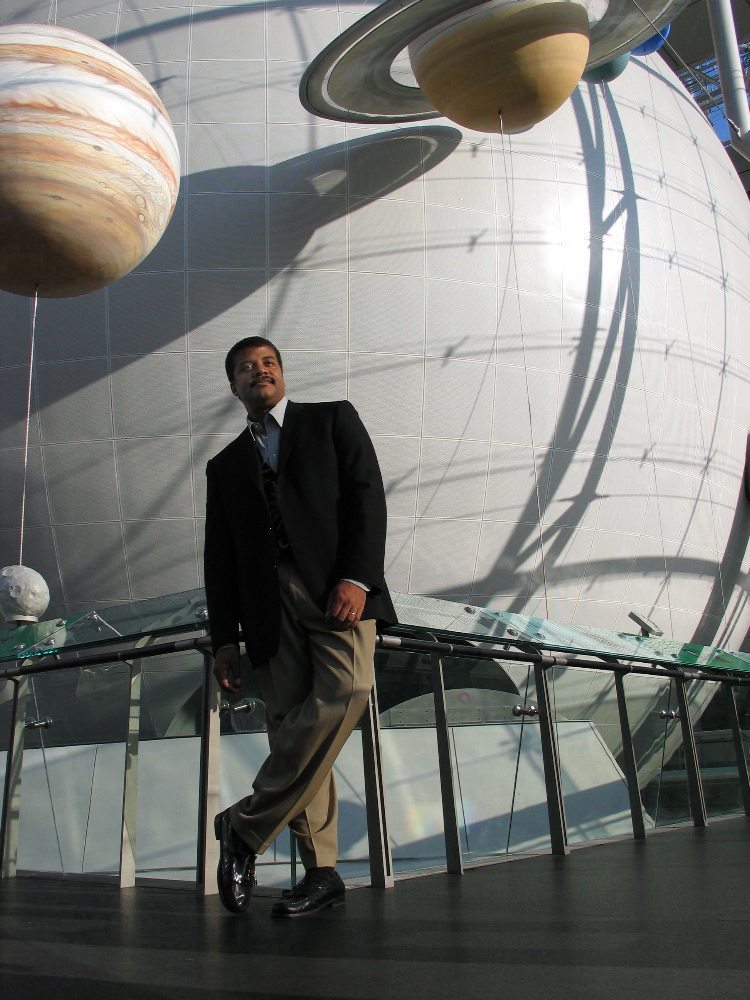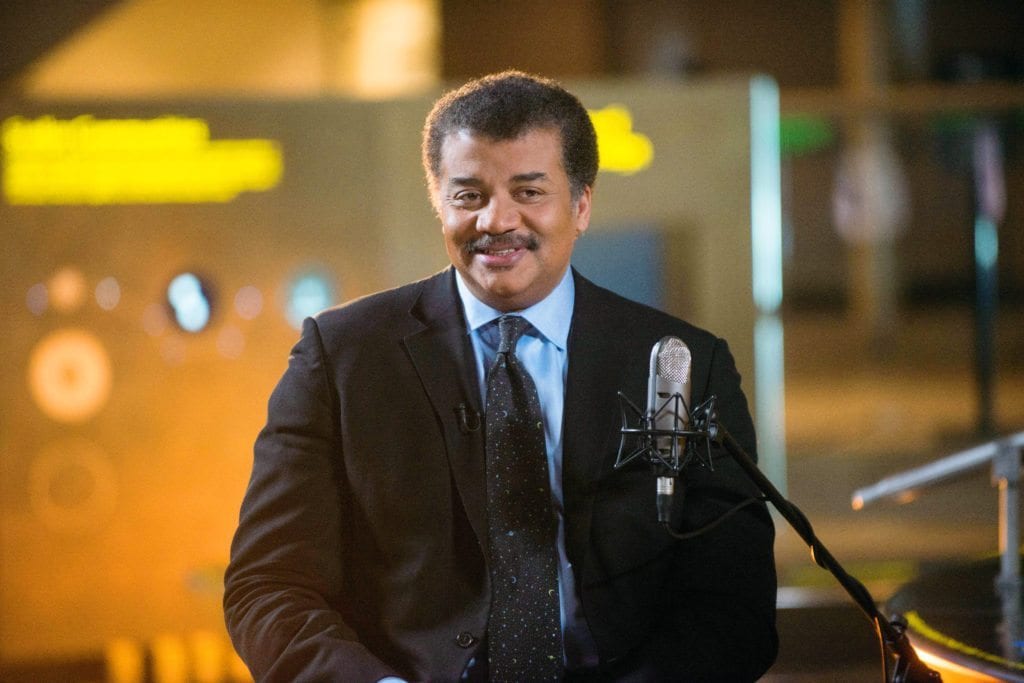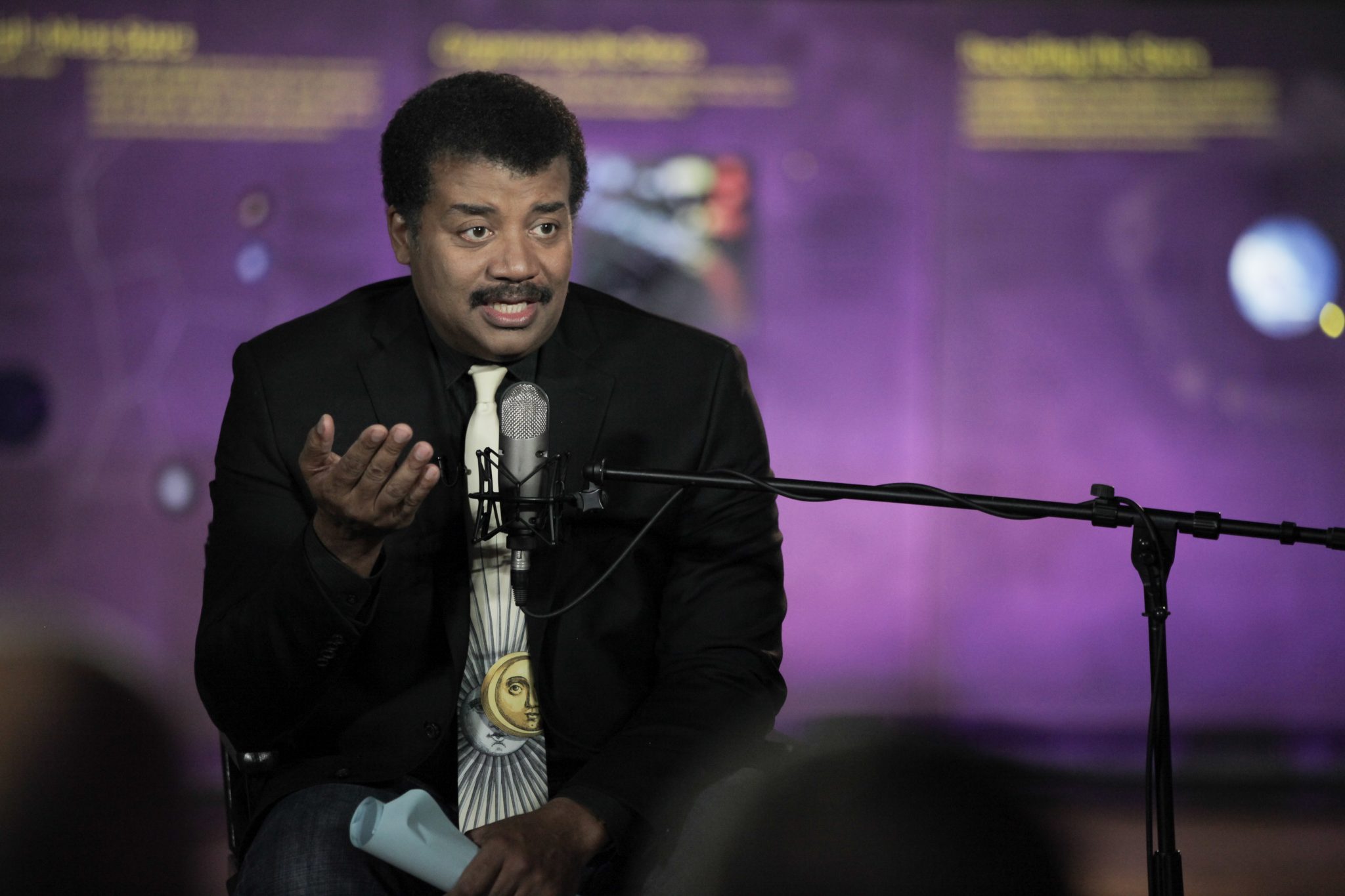Neil deGrasse Tyson is the most popular astrophysicist in the world. The three-time Emmy-nominated Astrophysicist and Ph.D. has nearly countless awards and honors (including ‘100 Most Influential People of the Year’ by Time in 2007 and ‘Sexiest Astrophysicist Alive’ by People in 2000), as well as honorary degrees from CUNY, Northeastern, Howard, University of Pennsylvania, and fifteen others.
Tyson is everywhere you turn in the media. He has hosted, produced, edited, and been otherwise involved with radio shows, TV shows (news, comedies, dramas, and more), mini-series, documentaries, and internet Q&A’s (he has over 5,000,000 followers on Twitter). Tyson has been a guest on The Colbert Report, The Daily Show with Jon Stewart, Real Time with Bill Maher, Late Show with Conan O’Brien, Late Show with Jimmy Fallon, and he’s recently made cameo appearances in Big Bang Theory and Brooklyn Nine-Nine. COSMOS, NOVA, and Origins are just a few projects he’s hosted.
StarTalk is his latest TV project. A National Geographic Channel spinoff of Tyson’s radio show/podcast, which initially aired in 2005, the Emmy-nominated show announced in January that will begin its third season in Fall 2016. In the show, he speaks with thought leaders, government officials, celebrities, and comedians about science in the late-night show. He is, in short, a master science communicator.
In this exclusive interview, Tyson shares his views about politics and threat of AI turning on us.

Credit: Daniel Deitch 2004
Innovation & Tech Today: When we look at both Hollywood and real life today, artificial intelligence is something that’s really expanding rapidly with drivable cars and smarter computers. Should we be afraid of AI like Terminator’s Skynet?
Neil deGrasse Tyson: We already have evidence that there’s nothing to worry about. Remember, a couple of decades ago, our best chess player in the world got beaten by a computer, Deep Blue. We invented the freaking game. Now we’ve created a machine that beats us at that game. Was that the end of the world? Did people cry that AI was going to live our lives for us? No. And a few years back Watson beats us at Jeopardy! And that’s pop culture! Computers didn’t invent pop culture. We did. And the best Jeopardy! player ever got served. Did we cry? No. Pilots in the most modern airplanes today are not really flying the planes. Computers are. Are we freaking out that the lives of hundreds of people are in the hands of the AI that is programmed into an airplane that enables it to fly efficiently and pilots are not adjusting the flaps so you have a stable ride? No. We have robots that build our cars.
I’m old enough to remember when there was a real chance in the morning that your car would not start. I was watching a movie with my son who is 14 and there was a chase scene and the car wouldn’t start, and he didn’t understand that. He has no experience with people not starting cars. Of course the car starts. That’s what happens when you push the button or turn the key because of AI. So, I think the concern for AI completely taking over civilization is overplayed.
I&T Today: As the 2016 Presidential Race is in full swing, why do you feel we’ve never had a scientist as a president of the United States? Do you think we ever could?
NdT:You may know that Einstein was offered the presidency of Israel back when the Israeli state was first created, or at least that was rumored to be so. It made for a fun story to retell anyway, if you can verify that online. But you cannot have a scientist as president of the United States until you have scientist politicians who are in the slots that feed the presidency, so that would be governors typically, or senators, or members of Congress, or other people in leading positions of respect or note. Without a large buildup of scientists in those positions, I don’t know if that will happen any time soon.
By the way, I don’t need a scientist president. I need a leader president. And part of what it is to lead is to know when you don’t know something, and then you reach for your advisors. So the best leaders are the ones that not only know what they know; they know what they don’t know. They understand what it is they don’t know and why they don’t know it, and then they seek the advices of their cabinet or the president’s science advisor who’s head of the Office of Science and Technology Policy (OSTP). By the way, the science advisor is not a cabinet position, but many people – myself included – think it should be.
I&T Today: How would scientific thinking help with the issues the federal government has had with topics like climate change?
NdT: I want people who are trained at making hard decisions in the face of objective facts, and you know who does that: business people, engineers, and scientists. You know who doesn’t do that? Lawyers don’t do that, not in general. A lawyer pleads a case because they want to win the case without specific regard to whether what they’re winning is true or not. That’s why you have lawyers on opposite sides of a case, and they’re going to argue what is true. And if they win legally that becomes the truth, whether or not it’s actually true. That’s what fascinates me about the difference between legal professions and other professions where objective truths matters and your argument stops if we disagree: it’s either you’re right and I’m wrong, I’m right and you’re wrong, or we’re both wrong. I don’t know two lawyers to ever have that exchange of words. Any two scientists will, engineers will, business people will, and so if you now put those folks in Congress, they can solve problems even when you layer partisan politics on it.
But if you take trained arguers, such as those in the legal profession, and layer in partisan politics, that’s a recipe for no action. We’ve suffered under much of that in recent Congressional sessions. I was on Bill Maher and I proposed that if Congress had more of these other people maybe there would be fewer impasses. People ought to be able to vote for whoever they want, but if we keep voting for people who are trained arguers, we shouldn’t then be shocked that they can’t agree with one another in the halls of Congress.

(photo credit: National Geographic Channels/Scott Gries)










